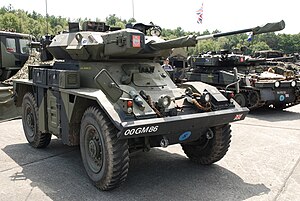Fox Armoured Reconnaissance Vehicle
| FV721 Fox | |
|---|---|

FV721 Fox in Ursel, Belgium
|
|
| Type | Armoured car |
| Place of origin | United Kingdom |
| Specifications | |
| Weight | 6.75 tonnes (7.44 short tons; 6.64 long tons) |
| Length | 5.08 m (16 ft 8 in) |
| Width | 2.13 m (7 ft 0 in) |
| Height | 2.2 m (7 ft 3 in) |
| Crew | 3 |
|
|
|
| Armor | Aluminium |
|
Main
armament |
30 mm L21 RARDEN cannon |
|
Secondary
armament |
Co-axial 7.62 mm L37A2 machine gun |
| Engine | Jaguar J.60 No 1 Mk 100B Petrol 190 hp (142 kW) |
| Power/weight | 28.1 hp/tonne |
| Suspension | Wheel |
|
Operational
range |
434 km (269.675 mi) |
| Speed | 104 km/h (64.6 mph) |
The FV721 Fox Combat Vehicle Reconnaissance (Wheeled) (CVR(W)) was a 4x4 armoured car manufactured by Alvis, deployed by the British Army as a replacement for the Ferret scout car and the Saladin Armoured Car. The Fox was introduced into service in May 1973 and withdrawn in 1993/4.
It had a crew of three and had a low profile rotating turret armed with a 30 mm L21 RARDEN cannon, which was manually fed with three-round magazines; 99 rounds were carried. A coaxial L37A2 7.62 mm machine gun was mounted with 2,600 rounds. The weapons were not stabilised. This turret was also equipped with a set of two 4-barrelled smoke dischargers. The vehicle had a combat weight of 6.75 tonnes and was designed to be air-portable. The Fox had aluminium armour and was fitted with a flotation screen. It lacked protection against nuclear, biological and chemical weapons. Powered by a Jaguar 4.2-litre 6-cylinder petrol engine, the Fox was one of the fastest vehicles of its type.
The Fox was typically attached to armoured and mechanized infantry battalions. The use of high mobility light vehicles such as the Fox would provide the ability to out flank heavier armoured divisions. This also potentially enabled the Fox to act as a scout and a vehicle that can engage similar light vehicles. The Fox's all-welded aluminium armour hull and turret protected against medium gun fire and artillery splinters, but did not protect the Fox from heavy (.50 calibre) machine gun fire. The driver sat at the front and had an integral periscope/hatch cover that lifted and opened to the right. The centre mounted turret held the commander/loader on the left and gunner on the right. They each had a rear-opening hatch cover.
...
Wikipedia
